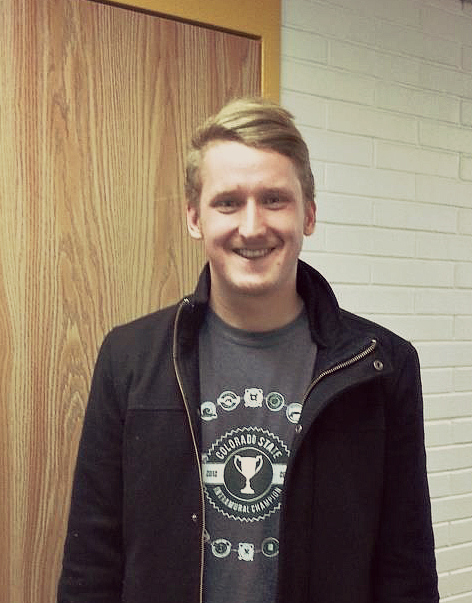The end of the semester is typically a mix of relief, exhaustion, and joy. Students who have worked hard all semester are looking forward to a break and some rest, to celebrating the holidays with family and friends. It is a bittersweet moment for many faculty because while they are looking forward to the same things, they also have amazing students who they might not see in class again. I am feeling mostly sad today because I had my last meeting with intern Tim Mahoney. He’s been so much fun to work with, is so enthusiastic, has done so much good work for the department, and wrote some of our most popular posts. He gets excited about good writing, has a sense of humor, and is happy to spend a good fifteen minutes discussing whether or not to use a comma in a particular phrase. He set a high standard for next semester’s incoming interns.
Tim is graduating this semester, making the move from student to alumni, so it seems appropriate that one of our last alumni profiles of Fall 2015 is his. Join me in wishing all the best to intern Tim Mahoney. He will be missed.
Why is it important to study the Humanities?
I have been asking this question during all of my interviews with the English faculty this semester. This is a much better than, “What are you going to do with an English degree.” I’m sure I’m not alone when I say that the latter question usually gives me an awkward feeling; like there is a right answer for what I should be doing with my degree.
I think that it is important to study English (and the humanities in general) because it helps you understand things in a broader context. Sure, we read a lot of books during our time as English majors, but I would consider the bulk of our work to be the critical thinking it takes to unpack our texts and more fully understand them. As English majors, our schooling makes us highly intellectual and critical people, who take the time to understand an issue before trying to solve it.
I think our critical minds and creative thinking are more crucial now than ever, as a lot of the problems facing our world are man-made. However, this also means that they can be solved by people as well. As English majors, we have the power to incite positive change in our society by using the critical processes we have been practicing here at the university.
What brought you to CSU?
My brother Thomas came to CSU in 2008, and was a senior here before I graduated from high school in Denver. I knew I wanted to stay in-state for college, but I thought Boulder was a little too close to home. I had visited Fort Collins a couple of times, a really liked the feel of the town. The people here love the outdoors, and biking, and I really just felt comfortable here. I knew I wanted to come to CSU, so this was actually the only school I applied for in high school. I knew I had the grades and the test scores to get in, so I felt it would be a waste of time to apply anywhere else.
What are you reading?
This semester, I have gotten really into nonfiction. I have been reading anything David Sedaris writes, including his collection of essays When You are Engulfed in Flames, and Let’s Explore Diabetes with Owls. I am about to leave the university so I have also been reading a lot of books on the craft of writing, including Bird by Bird by Anne Lamott, and On Writing by Steven King. Anything that will help me learn and improve my writing is worth reading.
What else do you do besides go to school?
For the past year and half, I have been volunteering as a mentor with Campus Corps, a mentoring program here at CSU which pairs youth from the Fort Collins community with students on campus. It’s a really fun way to do some good in the community, and it’s really incredible to get to meet and hang out with those kids.
How does it feel to be graduating?
I am fully aware that it is a cliché, and I don’t like how it sounds, but the experience is bittersweet. I am really excited to start the next chapter of my life, and go out and have new experiences, but I am sad to leave behind the university and the people I have met here. My friends, classmates, and professors have made my college experience so wonderful. I will miss meeting with professors and getting to know them and the incredible things they do.
I think I’m going to miss the culture of the university the most though. Here, we have such a vibrant community of learners where everyone is devoted to learning. It’s a pretty incredible place.
What advice do you have for future students?
You have probably heard it a hundred times, but that doesn’t make it any less true: Meet your professors. Go in and talk to them. My professors have been an incredible source of knowledge and inspiration for me, and I never would have had the experiences I have had if I never went in a talked to them. They have interesting stories and perspectives, and are incredible people who still love to learn.
I would stress that future students should go out and find community here at CSU. There are so many interesting clubs and groups I wish I would have joined. CSU, and college in general, has had such an impact on me as a person. I have had a lot of fun off campus, but the people I have met and lessons I have learned here on the campus are what I am going to remember for the rest of my life.
